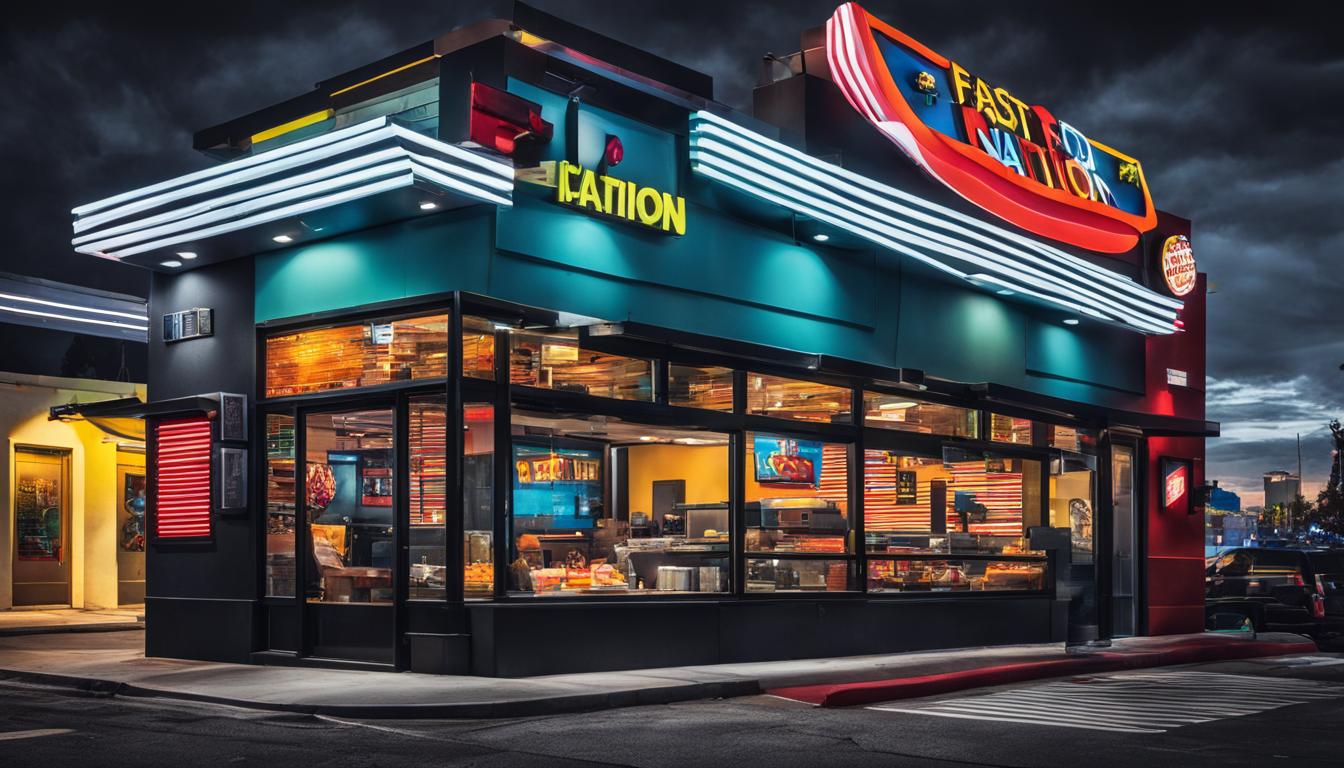If you’re looking for a critical analysis of America’s fast food industry, look no further than Eric Schlosser’s Fast Food Nation. This thought-provoking book delves into the grim realities of a global behemoth industry that has left a lasting impact on the way we eat and interact with food. In this audiobook review, we explore the effectiveness of the audiobook adaptation of Schlosser’s work, examining the narration style, the story’s impact, and the overall listening experience.
With candid insight and extensive research, Schlosser’s writing explores themes such as unhealthy practices, labor exploitation, and the impact on public health. For readers interested in exploring these hard-hitting topics, the Fast Food Nation audiobook is an immersive and unforgettable experience. Join us as we dive deeper into the world of Schlosser’s audiobook and its broader cultural significance.
Overview of “Fast Food Nation”
Eric Schlosser’s Fast Food Nation is a powerful exposé that pulls back the curtain on America’s fast food industry. The book explores the industry’s inner workings, including labor exploitation, food safety concerns, and the unhealthy practices that have become all too common. Schlosser’s investigative approach and compelling storytelling shed light on a dark side of American culture, making the book a must-read for anyone interested in understanding the impact of fast food on our society.
The book’s critical reception has been overwhelmingly positive, with reviewers praising Schlosser’s thorough research and incisive analysis. Fast Food Nation has become a cultural phenomenon, inspiring public discourse around food and consumer habits.
The Audiobook Experience
Listening to the Fast Food Nation audiobook is a unique and engaging experience. The book is narrated by Rick Adamson, who delivers a clear and concise reading that captures the essence of Eric Schlosser’s investigative journalism. Adamson’s narration style is steady and confident, allowing listeners to fully immerse themselves in the material.
The audiobook version of Fast Food Nation is an excellent medium for absorbing the content of the book. The author’s detailed research comes to life through Adamson’s narration, making it easy for listeners to follow along and understand even the most complex information. Additionally, listening to the audiobook enables people to multitask while engaging with the book.
The powerful narration amplifies the already thought-provoking content of Fast Food Nation, making it even more impactful for listeners. The combination of Schlosser’s writing and Adamson’s narration presents a compelling argument against the fast food industry’s unhealthy, exploitative practices and leaves a lasting impression on those who dive into this exposé through the audiobook format.
Pros and Cons of the Fast Food Nation Audiobook
| Pros | – Engaging narration by Rick Adamson | – Ability to multitask while listening | – Clear delivery of complex information |
|---|---|---|---|
| Cons | – Lack of visual aids for complex topics | – Some find audiobooks harder to retain information from | – Inability to easily go back to specific information |
Eric Schlosser’s Writing Style
Eric Schlosser’s writing in Fast Food Nation is impeccable and engaging. His storytelling is crisp and concise, making it easy for readers to understand complex concepts related to the fast food industry. Schlosser uses facts and statistics to support his arguments, adding credibility to his narrative. The author’s writing style, coupled with his investigative approach, creates a compelling exposé of the fast food industry.
Schlosser’s storytelling is a significant strength throughout the book. He uses anecdotes to humanize the stories of individuals working in the fast food industry. Through these stories, readers can empathize with the struggles of fast food workers and their families due to the unhealthy practices of the food industry.
The clear presentation of information, coupled with the engaging narrative style, appeals to a diverse audience, from scholars to everyday people interested in the topic. Schlosser’s writing acknowledges the complexity of the fast food industry comprehensively, from the supply chain to cultural influence.
Most importantly, Schlosser’s writing emphasizes the need for more responsible practices in the food industry. His storytelling encourages readers to take action through thorough research and paying attention to the food they consume. Overall, Eric Schlosser’s writing style is a critical component contributing to the credibility of Fast Food Nation as a seminal work of investigative journalism.
Key Themes Explored
Fast Food Nation is a powerful exposé on the fast food industry, uncovering several themes that will make you think twice before visiting your favorite fast food chain. Eric Schlosser reveals the unhealthy practices within the industry, from the use of synthetic flavorings and additives to create addictive foods to the exploitation of workers in the production line.
One of the most disturbing aspects of the book is the depiction of labor exploitation. Schlosser reveals how these multinational corporations often take advantage of vulnerable workers, particularly immigrants, paying them low wages and imposing exploitative working conditions. This is particularly evident in the meatpacking industry where workers face hazardous working conditions and are often maimed or killed on the job.
The impact of fast food on public health is also a central theme explored in the book. Schlosser exposes how fast food’s affordability and convenience have contributed to the obesity epidemic and the rise of diet-related diseases. The globalization of fast food chains and their spread to new, previously untapped markets is another aspect that Schlosser delves into.
Overall, Fast Food Nation is a wake-up call for consumers to be more aware of the impact of what they eat on themselves and the world around them. It is a powerful and thought-provoking read that should make everyone pause and reevaluate their eating habits.
In-depth Analysis of the Food Industry
Eric Schlosser’s Fast Food Nation provides a comprehensive analysis of the food industry, including the supply chain, food safety, and the impact of mass production. Through his investigations, Schlosser reveals the disconcerting realities of a system that prioritizes profitability over consumer health and safety.
One of Schlosser’s most notable focuses is on the food supply chain, a complex network of farmers, distributors, and retailers that underpins the food industry. Through his meticulous research, Schlosser exposes the exploitative practices that are prevalent throughout the supply chain, including the use of undocumented workers, low wages, and hazardous working conditions.
The author also devotes significant attention to the many issues related to food safety. Schlosser sheds light on the unsanitary conditions and other dangerous practices that are all too common in the industry, with particular emphasis on the dangers of E. coli and its spread through the national beef supply.
Moreover, Schlosser highlights the consequences of mass production and fast food culture. The industry’s insatiable demand for unprocessed meat, for example, has contributed to unsustainable conditions in feedlots and increased the use of antibiotics. This has led to the emergence of antibiotic-resistant bacteria that pose a significant threat to public health and safety.
The Consequences of Mass Production
| Consequences | Impact on Consumers |
|---|---|
| Inhumane Livestock Conditions | Misleading Meat Labels |
| Hazardous Working Conditions for Meatpacking Workers | Exploitative Labor Practices |
| Unsanitary Feedlots and Processing Plants | Increased Health Risks from Contaminated Food |
Through these revelations, Schlosser illustrates the need for reform within the food industry. He offers a sobering perspective on the reality of fast food culture and its impact on consumers and society at large.
Impact on Society
The impact of fast food consumption on society is far-reaching and complex. As Eric Schlosser reveals in Fast Food Nation, the cultural influence of fast food runs deep in American food habits.
America’s love affair with fast food began in the 1950s and has since transformed the way we eat and engage with food. The rise of fast food culture has made it easier and more affordable for consumers to access food on-the-go, but it has also had negative consequences on public health.

The societal impact of fast food consumption is not limited to public health concerns. It has also led to the globalization of fast food chains, toppling traditional values and customs in many corners of the world.
Cultural Influence
Fast food’s cultural influence is pervasive and extends beyond America’s borders. It has become a symbol of Americanization, with Western fast food chains proliferating in countries around the world.
| Country | Number of McDonald’s Locations |
|---|---|
| United States | 14,146 |
| Japan | 2,975 |
| China | 2,764 |
| Germany | 1,488 |
| France | 1,470 |
The cultural impact of fast food on these countries cannot be overstated. It has reshaped local culinary traditions and reshaped the way people view food. The seductive convenience of fast food has often come at the expense of local food businesses, which cannot compete with the mass-produced, inexpensive offerings of fast food chains.
Broader Implications
The broader implications of fast food consumption on society are many. As Eric Schlosser notes, the fast food industry relies on the exploitation of cheap labor, often from marginalized and low-income communities. The impact on workers can be devastating, with many working long hours without receiving a living wage. In many cases, the food served by fast-food chains is produced and transported using environmentally unsustainable practices.
The societal impact of fast food is a complex issue and one that requires careful consideration. Fast Food Nation sheds light on the dark side of America’s favorite meal and is a must-read for anyone interested in exploring the broader implications of fast food consumption on society.
Criticisms and Controversies
Despite the critical acclaim and widespread popularity of Fast Food Nation, the book has not been without its share of criticisms and controversies. One main criticism leveled against author Eric Schlosser is his alleged bias against the fast food industry, which some argue skews his research and analysis. Others have taken issue with Schlosser’s portrayal of workers in the industry, arguing that he paints an inaccurate and unfairly negative picture.
Another controversy surrounding the book is the accuracy of some of its claims and statistics. While most of the data used in Fast Food Nation is well-researched and backed up by credible sources, some have raised concerns about the veracity of certain claims made in the book.
It’s also worth noting that some within the fast food industry have disputed Schlosser’s findings and criticized the book for its negative portrayal of the industry. For example, the National Restaurant Association has publicly challenged Schlosser’s claims about working conditions in the industry.
The Validity of the Criticisms
While it’s important to consider and evaluate criticisms of Fast Food Nation, it’s also crucial to examine the validity of these arguments. Some critics may have valid points about the book, but it’s important to remember that the fast food industry has a significant stake in defending itself against negative portrayals.
Overall, while there are certainly valid critiques of Fast Food Nation, the overwhelming evidence and research presented in the book support its main arguments and conclusions. It remains an essential work in understanding the impact of the fast food industry on society, and its audiobook format allows even more readers to engage with its important message.
Audiobook Comparisons
Choosing the right format for reading Fast Food Nation is essential for a satisfying experience. Here, we compare the three main formats – Audiobook, Print and e-Book – and help you decide which one is the best for you.
Fast Food Nation Audiobook
The audiobook is the perfect choice for people always on the move. You can listen to it during your commute, while exercising or doing household chores. The narration by Rick Adamson is excellent, with a clear and engaging voice that is easy to understand. Additionally, the audiobook comes in a convenient MP3 version that can be played on any device. However, some users may find it challenging to focus on the content for extended periods or consume information adequately.
Fast Food Nation Print Book
If you prefer the traditional experience of reading a physical book, then the print version may be the best option for you. The printed book allows you to highlight sections or take notes and provides a more immersive reading experience that is free from distractions. However, the print version is less convenient to carry around and may not be suitable for readers with visual impairments.
Fast Food Nation e-Book
The e-book provides the best of both worlds, with the convenience of digital reading and the ability to highlight sections and take notes, and it also offers various font sizing options, increasing accessibility for readers with sight impairments. Additionally, the e-book’s built-in dictionary and search functionality make it easy to find definitions and explore specific concepts. On the flip side, e-books can cause eye strain, device dependency, and battery and storage limitations.
Ultimately, choosing the right format for Fast Food Nation depends on personal preference and lifestyle. To maximize your experience, it’s essential to consider the benefits and drawbacks of each format and think about the ideal reading environment for you.
Reception and Impact
The critical reception of Fast Food Nation has been overwhelmingly positive. The book has been praised for its meticulous research, compelling storytelling, and eye-opening revelations about the fast food industry. According to The Guardian, Fast Food Nation is “the kind of book that will change the way you see the world,” while The New Yorker hails it as “a passionately argued, incendiary polemic.”
Since its initial publication in 2001, Fast Food Nation has had a significant impact on public discourse around food. The book has sparked conversations about the consequences of fast food consumption on public health, environmental degradation, and labor exploitation. Its influence is still felt today, with activists, policymakers, and consumers referencing the book’s findings and recommendations.
The cultural impact of Fast Food Nation has been equally impressive. The book has played a pivotal role in shaping consumer behaviors and attitudes towards fast food. Following the book’s release, there was a surge in demand for organic and locally sourced produce, as consumers became more aware of the negative consequences of mass-produced fast food. The book has also inspired several documentaries, feature films, and TV shows that explore similar themes and issues.

Key Achievements of Fast Food Nation
| Impact | Details |
|---|---|
| Critical reception | Fast Food Nation has received critical acclaim from a wide range of publications and media outlets. It has been featured on bestseller lists and has won several literary awards. |
| Cultural impact | The book has inspired a cultural shift towards healthier and more sustainable food choices. It has also influenced popular culture, with films, TV shows, and documentaries exploring similar themes. |
| Public discourse | Fast Food Nation has sparked conversations about the fast food industry, its impact on public health and the environment, and labor exploitation. It has played a significant role in shaping public policies around food and agriculture. |
The enduring relevance of Fast Food Nation speaks to the power of investigative journalism to bring important issues to light. The book has challenged readers to reconsider their relationship with fast food and has empowered consumers to demand more ethical, sustainable, and healthy food options.
Recommended Audience
Fast Food Nation is a must-read for anyone interested in understanding the complexities of America’s food industry. The audiobook format provides an immersive experience for listeners who prefer an auditory approach to learning.
The book caters to a specific audience, including foodies, social activists, policymakers and consumers who are curious about what goes into their fast food meals. Through detailed research and compelling storytelling, Eric Schlosser uncovers the shocking truth about the fast food industry and the negative impact it has on public health, labor, and the environment.
If you are interested in becoming a more informed consumer and a catalyst for change within the fast food industry, then this book is for you. The audiobook format is particularly suited for commuters or multitaskers who can listen to the book while driving, exercising, or doing other daily activities.
Related Works
For readers interested in exploring similar topics to those covered in Fast Food Nation, we recommend the following books:
- The Omnivore’s Dilemma: A Natural History of Four Meals by Michael Pollan
- Salt Sugar Fat: How the Food Giants Hooked Us by Michael Moss
- Eating Animals by Jonathan Safran Foer
If you enjoyed Eric Schlosser’s writing style, we also suggest checking out his other works, including:
- Command and Control: Nuclear Weapons, the Damascus Accident, and the Illusion of Safety
- Reefer Madness: Sex, Drugs, and Cheap Labor in the American Black Market
| Fast Food Nation | The Omnivore’s Dilemma | Salt Sugar Fat | Eating Animals | |
|---|---|---|---|---|
| Author | Eric Schlosser | Michael Pollan | Michael Moss | Jonathan Safran Foer |
| Length (hours) | 9 | 15 | 14 | 10 |
| Narrator | Rick Adamson | Scott Brick | Scott Brick | Jonathan Todd Ross |
| Publication Date | 2001 | 2006 | 2013 | 2009 |
| Theme | Fast food industry | American food culture | Processed food industry | Meat consumption and production practices |
When it comes to choosing an audiobook format, ultimately, it comes down to personal preference. Each audiobook provides unique insights into the food industry.
Discussion and Book Clubs
Fast Food Nation by Eric Schlosser provides thought-provoking material for book club discussions. Here are some discussion questions to guide your conversation:
- What shocked you most about the fast food industry as presented in the book?
- Do you think fast food chains have a responsibility to address the unhealthy practices and labor exploitation prevalent in the industry?
- How has the globalization of fast food chains impacted the spread of fast food culture in different countries?
- What role do you think government regulation should play in regulating the fast food industry?
For those interested in hosting a book club centered around Fast Food Nation, we recommend pairing the book with a selection of fast food meals. Alternatively, you could opt for healthier alternatives and reflect on the nutritional value of each meal consumed during the discussion.
Note: Be sure to check for any dietary restrictions among your book club members before choosing the food options.
Takeaways and Final Thoughts
Fast Food Nation is a groundbreaking work of investigative journalism that exposes the dark side of America’s fast food industry. The audiobook adaptation brings Schlosser’s compelling narrative to life, providing a rich and vivid listening experience.
Key Takeaways:
- The fast food industry has a significant impact on public health and the environment, contributing to issues such as obesity, heart disease, and pollution.
- Labor exploitation is prevalent throughout the fast food supply chain, with workers often facing low wages, poor working conditions, and little job security.
- Fast food culture and marketing campaigns have a lasting influence on American food habits and consumer behaviors, contributing to the globalization of fast food chains.
- Eric Schlosser’s in-depth analysis of the food industry sheds light on critical issues such as food safety, mass production, and supply chain management.
Overall, the Fast Food Nation audiobook offers a thought-provoking exploration of America’s fast food industry and its effects on society at large. Schlosser’s impactful reporting and engaging storytelling make this book a must-read for anyone interested in food culture, labor rights, and corporate responsibility.
Image:
Conclusion
In conclusion, the Fast Food Nation audiobook is a powerful exposé that sheds light on the dark side of America’s fast food industry. Eric Schlosser’s investigative approach provides readers with a thought-provoking analysis of the impact of fast food on society, from unhealthy practices to labor exploitation, and beyond.
The audiobook experience of Fast Food Nation adds a new dimension to the book, immersing listeners in Schlosser’s compelling narrative. The narration style and delivery of the content are engaging and impactful, making it an ideal format for those who prefer to listen rather than read.
While the book has garnered its share of criticisms and controversies, its influence on public discourse and consumer behaviors should not be overlooked. Fast Food Nation has left a lasting impact on both readers and society, shining a light on the dangers of mass production and fast food culture.
In summary, the Fast Food Nation audiobook is a must-read for those interested in exploring the complex issues surrounding the fast food industry in America. Whether you’re a concerned consumer, a food industry professional, or simply interested in the impact of food on society, this audiobook will provide you with a profound understanding of the issue, leaving you with plenty of food for thought.



